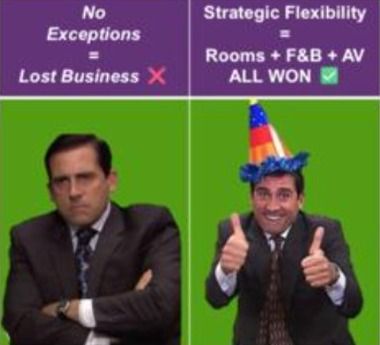By Gabriela Otto, President of HSMAI Brazil and Latam, direct from Indianapolis, US, at HSMAI Commercial Strategy Week 2025

A Revenue Manager who doesn't talk to Sales and Marketing is falling behind—and that's no small feat.
The commercial strategy landscape in the global hospitality industry no longer allows for silos. The panel brought a very clear message: isolated Revenue Management has lost its importance. Success today depends on deep collaboration with Sales, Marketing, and Distribution, or, as one of the panelists summarized, speakers, “it's not just about leads, but to win and retain customers.”
Led by Keri Spivey (Expedia Group), Lauren Travis (Sage Hospitality Group), Scott Dahl (Les Roches Global Hospitality) and Tre Wilke IV (Evans Hotels), the panel “What Every Revenue Leader Should Know About Sales, Marketing & Distribution” It was a true guide for those who want to be one step ahead.
The customer is changing. The data that most impacted the audience was this: today's traveler consults an average of 277 sites before booking (Expedia data, 2024). The dispersion and complexity of the purchasing journey demands much more than a good price.
What to learn from Sales
What every Revenue Manager in 2025 should (really) know:
- Sales isn't just about filling rooms, it's about building relationships.
Long B2B sales cycles require trust and time, and that future demand isn't reflected in your market report. - Flexibility overcomes rigidity.
A rigid price kills business. A cited example: losing an event with revenues of R$ 60,000 because the average rate wasn't flexible by R$ 50.
- No exceptions = lost business
- Strategic flexibility = Rooms + F&B = everyone wins
This phrase appeared in a funny image of the panel (those in the room understood the provocation well).
- No exceptions = lost business

- Tariffs are designed to close deals, not kill sales.
- Total revenue matters more than ADR or RevPAR.
The rooms are just the gateway. The vision must be one of total contribution: events, food and beverage, spa, parking, room service, minibar… everything counts.
So think like a GM, in the end, it's ALL about total contribution.
Booking 30 rooms at R$ 500 is just part of the game. What matters is adding the ancillary revenue: R$ 15,000 from F&B, events, etc. As they summarized: “Rooms are just the beginning. Sales sells the whole hotel.”
In a modern, total-contribution-oriented hotel industry, the Revenue Manager's responsibility is to ensure maximum profitability for the entire business—not just the accommodations.
On the other hand, the Sales team needs to understand that its role is to sell the hotel as an ecosystem of experiences, not a block of room inventory.
Today's guest buys the sum of: accommodation + gastronomy + well-being + convenience + lifestyleIf the Revenue and Sales vision isn't aligned with that, the hotel loses opportunities, market share, and, of course, margin.
What to learn from Distribution
The future of RM and Sales is collaborative and strategic. It's no longer about "rate control," but about comprehensive business intelligence.
One of the trends is Generative Engine Optimization.
Examples:
- A boutique hotel in Bento Gonçalves publishes a signature winery guide—and positions itself as a benchmark in the industry.
- Adding FAQs (Frequently Asked Questions) to the website makes it easier for AI to use and chatbots, helping with indexing and visibility in voice searches.
- Ensure presence on channels such as Tripadvisor, Booking, and local tourism sites.
- Implement schema (structured data) so that AI and search engines can “read” the hotel more accurately.
- Build backlinks (links from other sites that point to yours) of influence (top 10 lists, influencers, blogs reference).
What to learn from Marketing
This marriage is mandatory. And the keys to true collaboration are:
- Spending time with the teams
- Explain the “why” of metrics
- Connect KPIs with guest segments
- Include Marketing in Yield Meetings
- Experiences should be more “on the rise” than the price in your concept
- Offers must reflect the brand's DNA
- Package products with storytelling and authentic experiences
- Align all channels (site, search, social, PR) for maximum consistency
We're talking about a story that sells, something that goes far beyond your brand's logo.
Those who remain in the ADR silo will inevitably lose ground to those who have already understood that today's guest doesn't just buy a rate, but experiences, stories, purpose, and, of course, convenience.
For (target customer), who is looking for (specific need or desire), the (hotel name) is a (market segment or positioning) that offers (main benefits) differently than (competition or alternative solutions), through (its unique differential or exclusive value proposition).
This simple formula serves as the strategic foundation for all your communication, package creation, and marketing strategy. pricingIt's a guide to avoiding the mistake of competing solely on price or making generic offers that don't connect with your ideal audience.
Each component of the sentence forces the hotel to reflect:
- Target customer: Who do you want to attract (profile, segment, behavior)
- Need/Want: What is that person really looking for when choosing a hotel?
- Segment/positioning: Your place in the market (luxury, lifestyle, wellness, bleisure…)
- Main benefits: What the guest gains in practice (not just “comfort,” but actual perceived value)
- Differential compared to the competition: How you stand out — whether through service, design, experiences, purpose…
- Unique value proposition: What brings it all together and makes your hotel memorable
It was a panel full of valuable insights and reinforces what we've long advocated at HSMAI Brazil and Latin America events: commercial strategy is a collective game. Revenue, Marketing, and Sales need to work together with an integrated vision of total profitability.



